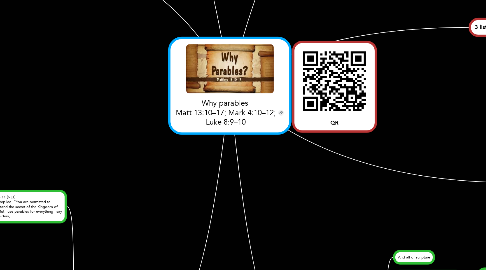
1. How the mystery hides
1.1. Mark 4:11 (NLT) 11 He replied, “You are permitted to understand the secret of the Kingdom of God. But I use parables for everything I say to outsiders,
1.1.1. Why would Jesus keep it a secret?
1.1.2. John 16:8 (NLT) 8 And when he comes, he will convict the world of its sin, and of God’s righteousness, and of the coming judgment.
1.1.2.1. First work of the Holy Spirit in our lives
1.1.3. Understanding parables are only for those who are open to truth
1.1.4. Until you take a step of faith, God's best wisdom will elude you
1.1.5. Parables also means bewildering puzzles. Revelation becomes riddles and stumpers to the hardened, shallow, and indifferent mind; and the end result is befuddlement.
1.1.6. Parables are a “two-edged sword” that reveal the mystery of the kingdom to disciples who understand but create blindness in others.
1.1.6.1. 1 Corinthians 1:18 (NLT) 18 The message of the cross is foolish to those who are headed for destruction! But we who are being saved know it is the very power of God.
1.1.6.2. Exodus 14:20 (NLT) 20 The cloud settled between the Egyptian and Israelite camps. As darkness fell, the cloud turned to fire, lighting up the night. But the Egyptians and Israelites did not approach each other all night.
1.1.6.2.1. A way forward on one side
1.1.6.2.2. Blindness on the other side
1.1.6.3. The world opens up when a step of faith is takes
1.1.6.3.1. What is that step... THE BIBLE IS TRUE!
1.2. Does Jesus deliberately exclude
1.2.1. Isaiah 6:9 (NLT) 9 And he said, “Yes, go, and say to this people, ‘Listen carefully, but do not understand. Watch closely, but learn nothing.’
1.2.2. Isaiah 6:10 (NLT) 10 Harden the hearts of these people. Plug their ears and shut their eyes. That way, they will not see with their eyes, nor hear with their ears, nor understand with their hearts and turn to me for healing.”
1.2.3. Truth hardens the heart of those who
1.2.3.1. Want to be deceived
1.2.3.2. Don't like the truth
1.2.3.3. Pro Choice vegans who will not eat an egg
1.2.3.4. Cognitive dissonance refers to a situation involving conflicting attitudes, beliefs or behaviors. This produces a feeling of mental discomfort leading to an alteration in one of the attitudes, beliefs or behaviors to reduce the discomfort and restore balance.
1.2.3.4.1. 1
1.2.3.4.2. When part of you knows your wrong, it makes you angry and stressed.
2. God calls his faithful to preach to the faithless
2.1. Parable of the sower scatters seed everywhere, not just where it is likely to grow.
2.2. Jeremiah
3. Insiders and outsiders
3.1. Difference?
3.1.1. Outsiders not kept outside
3.1.2. Insiders
3.1.2.1. Gather around
3.1.2.2. Pursue
3.1.2.3. Seek
3.1.2.3.1. Pear of great price
3.2. Jesus’ insights were hidden from those who refused to seek the truth and from those who would not come back and inquire.
3.3. Responsibility of Christian to Listen/Learn/Seek truth
3.3.1. Seeking truth has 3 requirements
3.3.1.1. Time
3.3.1.2. Concentration
3.3.1.3. Faith
3.3.1.3.1. Not always going to understand everything
3.3.2. Matthew 25:29 (NLT) 29 To those who use well what they are given, even more will be given, and they will have an abundance. But from those who do nothing, even what little they have will be taken away.
4. What is a Parable?
4.1. Mark 4:10 (NLT) 10 Later, when Jesus was alone with the twelve disciples and with the others who were gathered around, they asked him what the parables meant.
4.2. Parable (מָשָׁ֑ל, mashal; παραβολή, parabolē). A story or saying that illustrates a truth using comparison, hyperbole, or simile. Can be a model, analogy, or example.
5. Understanding Parables
5.1. And all of scripture
5.2. Understand the social, historical, and cultural context of the parable
5.2.1. Persistent widow Luke 18: 1– 8, it helps to know that in the first century widows often experienced hardships
5.3. Know the point the parable is trying to make ie, original intent
5.3.1. Who are characters
5.3.2. What did they learn
5.4. Consider to whom the parable is directed
5.4.1. Disciples?
5.4.2. Jewish leaders?
5.4.3. The crowds?
5.5. Realize repetition in parables stresses the main point
5.6. Identify stock symbolism
5.6.1. God is pictured as
5.6.1.1. Father
5.6.1.2. King
5.6.1.3. Judge
5.7. Note the conclusion of the parable.
5.7.1. Last person, deed or saying often conveys the significance
6. 3 listeners to Jesus' parables
6.1. Leaning in
6.1.1. Becoming disciples
6.2. Leaning out
6.2.1. Opposing him
6.3. Some try to sit out
6.3.1. Jesus insisted there is no middle ground
6.3.1.1. Matthew 12:30 (NLT) 30 “Anyone who isn’t with me opposes me, and anyone who isn’t working with me is actually working against me.
6.3.1.2. Matthew 12:31 (NLT) 31 “So I tell you, every sin and blasphemy can be forgiven—except blasphemy against the Holy Spirit, which will never be forgiven.
6.3.1.3. Matthew 12:32 (NLT) 32 Anyone who speaks against the Son of Man can be forgiven, but anyone who speaks against the Holy Spirit will never be forgiven, either in this world or in the world to come.
6.3.1.4. The sin that cannot be forgiven is rejecting Jesus
